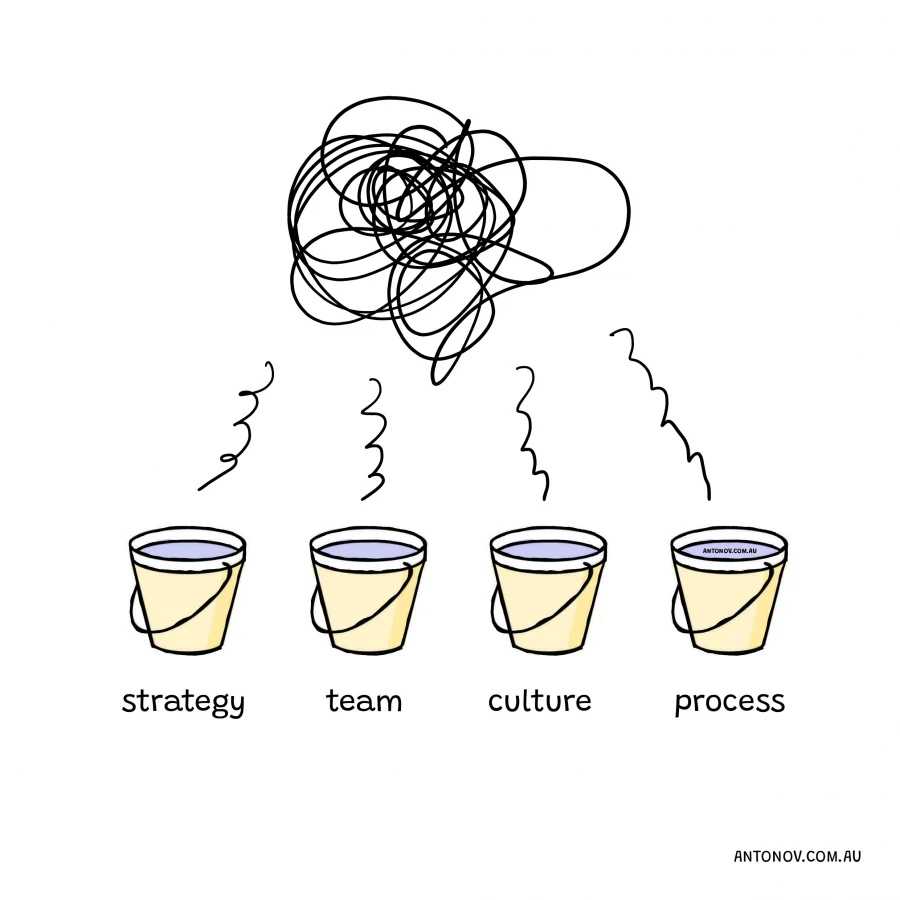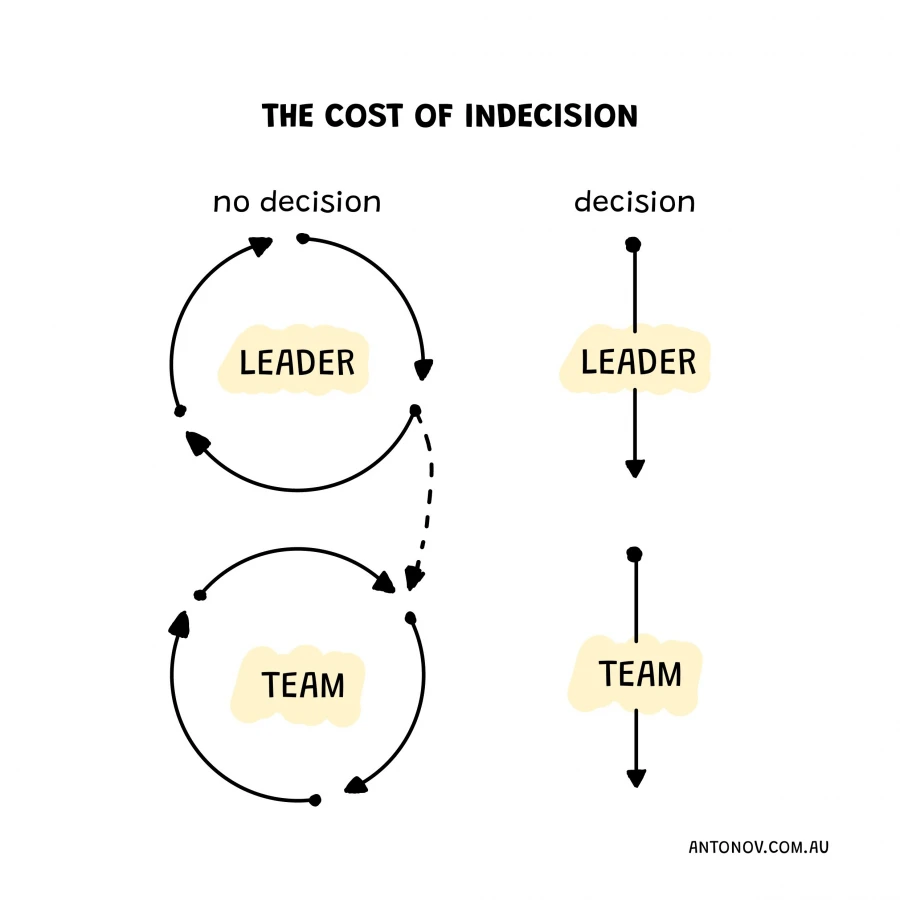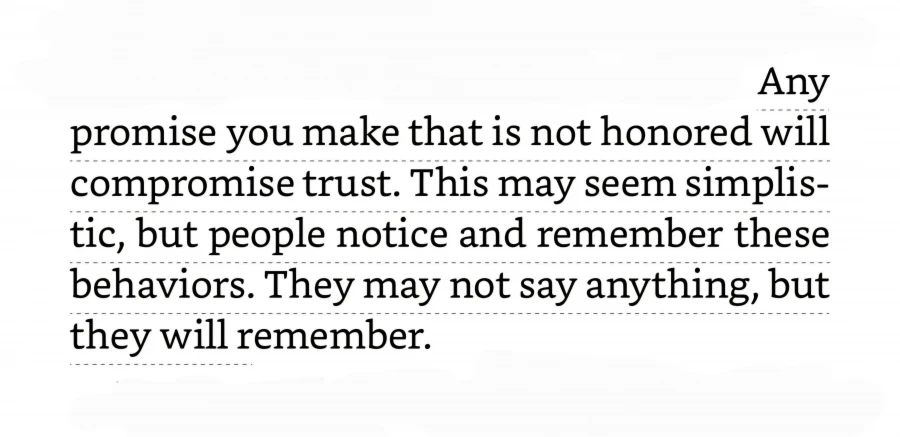I'm a father of three from Sydney, a Product Director and a Product Coach. I write about product management and run the Product Manager community.
Subscribe to receive digest emails (1 per month).
Info
Posts with Leadership tag.
-
Everything a CEO does can be boiled down to 3 main things: Setting direction, enabling people, and driving outcomes.
The best leaders know which of these matters most at any given time, and they shape their schedule around it.
Companies led by someone who understands that balance have a clear edge over those that don't. -
Leaders push for speed so hard they forget the basics - a clearly communicated direction.
Everyone understands the direction eventually...once it's downhill. -
Skills can be taught. Values can't...or at least not fast enough.
Don't waste interviews checking boxes or handing out take-home builds. Run live Q&A sessions. Watch how they think, how they ask questions, how they handle trade-offs under pressure. That's where you find the right fit. -
A strong leader multiplies effort into outcome. A weak one multiplies uncertainty into noise.
-
Start coaching with curiosity. Don't tell them what to do. Ask what they're trying to achieve. What's blocking them? What are they unsure about? Where do they want to grow?
Then shut up.
Listen. Let them think it through. Let them fumble. Hold back your instincts to solve it for them. Because your job isn't to be the smartest voice in the room. It's to help them hear their own. -
Autonomy sounds like what everyone wants. But when people don't know the boundaries, the mission or the metrics - it turns into a shit show. People go in different directions. Habits drift. Culture slips.
Constraints aren't limits. They're clarity. Constraints say: This is what we care about. This is how we work. This is where we're going. Give your team the freedom to move but make the edges visible. -
The best CEOs are dual-lens operators.
Vision. Timing. Cash. They hold the big picture in their heads but stay anchored in the work. Product. Blockers. People. They see the nuance most miss. That mix is rare. The real limiter is processing power.
As companies scale, updates shift from chat to text. Verbal syncs don't scale. Reading does. Which is why CEOs must build teams who write clearly and asynchronously. Not optional.
Clarity equals speed. If your execs can't communicate in writing, you'll be stuck in meetings forever.
The CEO's leverage comes from how well the team writes. -
Brilliance doesn't excuse bad behaviour.
Some leaders get away with everything. They shout. Interrupt. Get angry. Dismiss. Their results or tenure buy them silence. People tiptoe around them. Their tantrums get labelled “passion”. But under the surface, the team is hurting. The fear is real. Ideas shrink. Collaboration dies. Turnover spikes. The cost isn't loud. It's quiet...and compounding.
And here's the lie: “We need them”.
No, you don't.
You're just scared of the gap they'll leave. But that gap creates space for healthier leadership, for calmer thinking, for people who can deliver and respect others. High performance doesn't have to come wrapped in chaos. The best leaders know when to push, when to listen and when to shut up.
It's not enough to be brilliant. You have to be someone others want to follow.
Culture gets built by who you promote and protect. Letting toxic behaviour slide, just because someone's talented, tells the whole team one thing: this behaviour is ok. And that message spreads. Fast.
So stop making excuses for bullies. If they can't lead with discipline, they don't get to lead at all. -
Change doesn't come from a reorg or a new title on a slide.
It comes from the person who says, “This isn't good enough,” and then does something about it. Quietly. Consistently. Without waiting for permission. That's what standards are - choices made over and over, even when they're inconvenient, invisible, or unpopular.
The real power isn't in setting high standards. It's in holding them when no one's watching. When shortcuts are easier. When mediocrity is the norm. That's where most people cave. They look around, see no one else pushing, and assume it's not worth the fight.
But it is.
Every time someone sticks to their standard, it makes space for someone else to do the same. Not with big declarations, but with small acts of defiance against the average.
The more people who hold the line, the easier it becomes to draw a new one. Holding the line isn't easy - but a product management coach can support you in leading with consistency. -
You see the promises fall flat.
You watch them dodge decisions, fumble delegation and ignore the weight of a frustrated team.
It feels like yelling into a void.
But you still show up. Not for them - for the people beside you. You lift the work with your peers. You raise the bar. You protect the standard. You become the person who cares when no one else does. Even with a ceiling pressed down on your growth, your pride, your pay - you stay. You find meaning in the work itself. Because the work matters.
But ceilings don't stay soft forever. Sometimes they turn to concrete.
The team starts shrinking from bold to bitter. Feedback goes quiet. Energy fades. You feel it in your bones: you're no longer growing, just grinding.
That's when the question hits - how long do I keep pushing when it's clear no one's listening?
As I've said before: “The standard you walk past is the standard you accept.”
That applies to toxic culture. But it also applies to dead-end leadership.
So if your ideas can't rise, if your potential gets capped, if staying means shrinking.
There's only one move left.
Leave. Before they forget what you're capable of. Before you do. -
Yearly performance reviews aren't good. You have probably seen neglected and outdated goals in performance reviews in your career. They become irrelevant pretty quickly. Worse, they do more harm than good.
The best teams ditch the annual review cycle. Instead, they focus on:- Continuous feedback
- Small, actionable coaching
- Growth over grades
- Space for trial, error and mastery
Solid teams that don't wait a year to improve. They get better every day. -
Messy teams don't mean broken teams.
They're just growing. Growth kicks off the “storming” phase - overlaps, confusion, delays. Everyone's working hard, but everything feels slow.
That's not a motivation problem. It's an ownership problem.
When no one's clearly accountable, things fall between the cracks. Work stalls. Friction builds. Blame starts to creep in. But assign clear ownership - name, scope, outcome - and everything changes. Now someone's driving. Now someone's finishing.
Ownership creates motion. Shared responsibility sounds nice, but it rarely works. When everyone owns something, no one owns anything.
So make it visible. Write it down. Who owns what. Why it matters. When it's due.
That's how work moves forward. Not with good intentions. With clear accountability. -
People think they're not getting feedback.
But they are - they just don't recognise it.
A simple way to fix this? Make it obvious. Instead of letting feedback blend into daily conversations, label it: “Here's some feedback for you.”
That small shift makes a big difference. -
Results First
Your first responsibility as a manager is to deliver results.
Not culture. Not vibes. Not endless check-ins. Results.
Too many new managers fall in love with the performance of management. They build ... Read more -
Centralised decision-making will always create bottlenecks. Sooner or later, this will prevent your company from growing.
Traditional and rigid organisations value hierarchy, and leaders often think they need to control every decision.
But this slows innovation, delays time to market, and prevents teams from learning.
Create a culture of ownership at every level. Empower your team to make decisions within their areas of expertise. Trust fuels faster progress. -
Joining a new company as a leader is tricky and sometimes it does feel like stepping into chaos.
There's so much for you to process – new people, culture, challenges, expectations, competing and unclear priorities and pressure to deliver results.
I like to slow it down. I don't try to fix everything on day one. I focus on the context, the big picture first, understand the team and what they need my help with. Once I get where we are going and why, I can focus on the culture and processes to get to the destination faster with stronger teams.

-
It's crazy how many leaders don't know much about their team. They are not curious about their motivations or aspirations, not only professionally but also on a personal level.
Get to know your team. What are their hobbies? What are they exploring? How are their families? Where are they planning their next trip? What are they watching? What are they reading?
Make it a weekly session. It takes just half an hour but builds a much stronger connection. This is important. Stronger connection = more trust. More trust = better feedback, better communication, higher quality of work and more motivation. -
Most engagement surveys don't measure engagement.
They measure vibes.
The problem isn't the intent - it's the output. You run a survey. You get a 67.8% “engagement score.” Someone builds a deck. Charts go up, comments stay anonymous, nothing changes.
That number doesn't tell you who's struggling. It doesn't tell you why trust is low. It doesn't tell you where the rot is starting. It just tells you people clicked a box.
Real engagement isn't a metric. It's a conversation.
Ask them how they're feeling. Ask what's blocking them. Ask what's making their work better - or worse. Then shut up and listen. Not just in surveys. In 1:1s. In retros. In offhand comments. The signal's already there. You don't need a dashboard. You need ears.
Pie charts don't build trust. Conversations do. -
Misaligned leadership doesn't announce itself. It creeps in. Slowly. Quietly. Then it wrecks your team.
Leaders think the damage is minor. Temporary. Invisible. But it's not. It's heavy. It's real. It shows up in whisper networks, in backchannel Slacks, in passive standups where nobody commits because no one knows where things are going.
You see it when smart people play it safe. When the loudest voice wins. When meetings drag on because no one wants to be the first to say what everyone's thinking. You feel it in the hesitation. That's the real killer.
Disagreement isn't the problem. Lack of alignment isn't even the real issue. Teams can live with that. What they can't survive is hesitation. Leaders who won't commit. Who won't decide. Who stay neutral until it's too late and now the team's solving the wrong problem. Again.
Indecision isn't neutral. It's destructive. Especially when disguised as “consensus-building” or “being thoughtful.” Teams need a decision. Even the wrong one. Because wrong moves can be corrected. Hesitation can't.
Leaders, pick a path. Say it out loud. Then stand behind it until you know it needs to change.
Make the fucking decision. Your team's already waiting.

-
Trust breaks when promises break. People notice, even in silence and they remember. Honour commitments - trust depends on it.

Feel free to reach out: [email protected].
